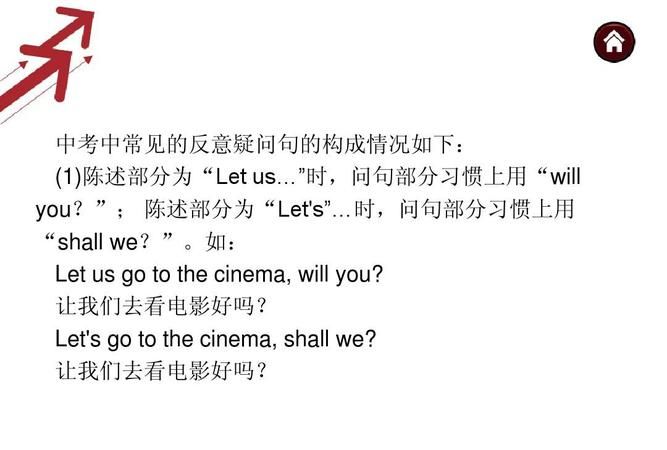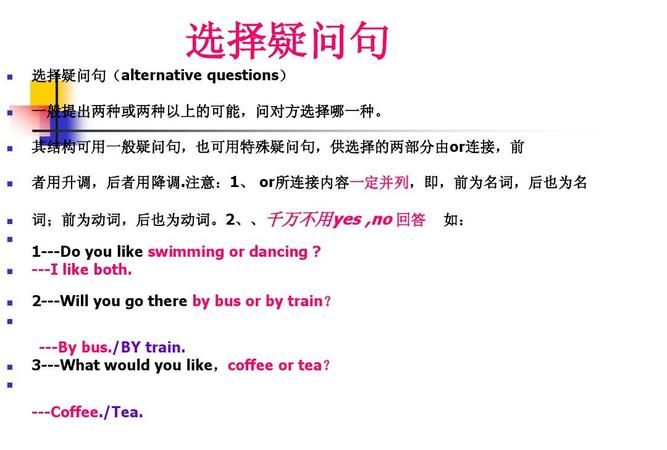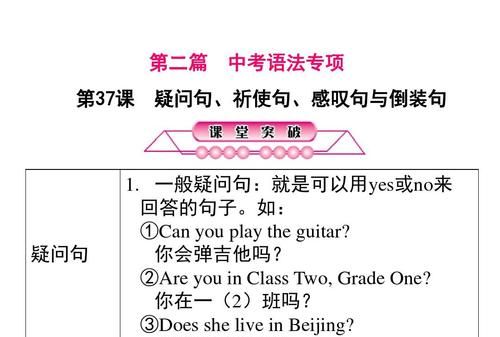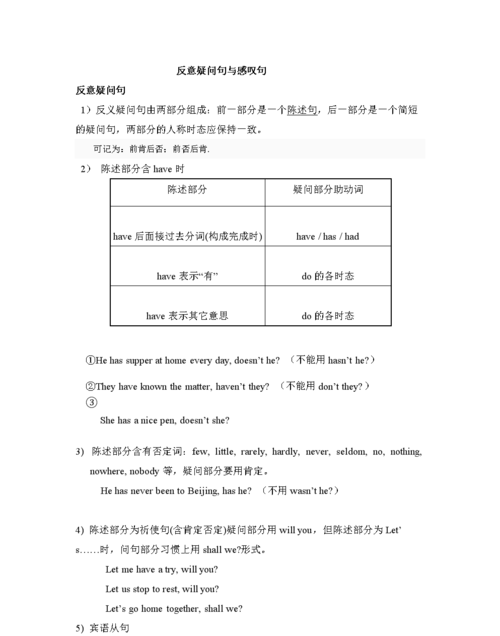本文目录
句子结构英语陈述句、疑问句、祈使句、感叹句、状语从句、名词性从句、定语从句
1,陈述句:主谓宾是主要的,至于状语、补语等位置比较灵活;,
2,疑问句:疑问词(when,what,how等)+系动词(is,am,are)或助动词(do,does)+主谓
3,祈使句:一般祈使句的默认主语为you,所以一般是谓语+宾语的形式,
4,感叹句:疑问词+中心词(一般有两种形式,what+名词或者how加形容词)+主谓,
5,状语从句:从句整体做状语,说是从句,其实相当于一个副词
eg:put the book where it's put before
where it's put before 是一个状语从句,put the book 是祈使句成分已齐全,where it's put before只是一个地点状语而已,
6,名词性从句:整体相当于名词
eg:I don't know what you think
what you think相当于名词,
7,定语从句:整体相当于形容词;他与名词性从句区别
I don't know what you think改为定语从句(what you think在句中作谓语,)
I don't know the thing you think(I don't know the thing主谓宾齐全, you think是对the thing的修饰)

英语有陈述句疑问句祈使句感叹句那这些句子由什么构成
陈述句:主语+谓语/系动词+宾语
疑问句:疑问词+一般疑问句,eg:what are you doing
祈使句:动词原型+短语,eg:turn down the music
感叹句:感叹词+其他成分,eg:how beautiful she is!
具体的结构不好讲,只能通过例子给你看看,多看看就知道怎么写了,不难的

英语中感叹句的基本结构是哪些
感叹句是表示喜怒哀乐等强烈感情的句子。感叹句句末通常用感叹号,读时一般用降调。 二、感叹句的常见形式 1. 由what引出的感叹句 其基本结构是“what+a [an]+形容词+名词+主语+谓语”: What a clever boy he is! 他是多么聪明的孩子呀! What a good heart you have! 你的心肠真好! What an interesting book it is!这是多么有趣的书呀! What a good time the children are having! 孩子们玩得真高兴呀! 若其中的名词为复数或不可数名词,则不用不定冠词: What clever boys they are! 他们是多么聪明的孩子呀! What beautiful floweres they are! 这些花多么漂亮呀! What bad news it is! 这是多糟糕的消息呀! 在一定的语境中,若语义明确,名词前可以不用形容词: Oh, what a wind! 啊,风真大! What a fool he is! 他真是个笨蛋! 另外,感叹句中的主语和谓语有时可以省略: Oh, what a fine day! 啊,多好的天气! What great fun! 多有趣啊! 【注意】 (1) 有时感叹句句末可能跟有不定式或动名词等结构: What a joy being with you! 和你在一起真是令人高兴! What a joy to have you with us! 有你和我们在一起真令人高兴! Oh, what a mistake it is to have come! 啊,来这里是个多大的错误呀! (2) 该结构中的形容词不能是表数量的many, much, little, few,遇此情况要用how,即使它们后面跟有名词: How many books he has! 他的书真多! How much money he gave her! 他给了她好多钱呀! How little money I have! 我的钱多么少呀! How few friends he has! 他的朋友真少! 比较:What a little box it is! 多小巧的盒子呀!(该little不表示数量) 2. 由how引出的感叹句 基本结构是“how+形容词或副词+主语+谓语”: How tall the man is! 这个人真高! How beautiful the girl is! 这个女孩真美! How slow he drives! 他开得真慢! How tired he looks! 看上去他是很累了! How well you look! 你气色真好! How beautifully you dance! 你舞跳得真好!在一定的语境中,若语义明确,how后可以不出现形容词或副词;有时不出现形容词或副词可视为how修饰句中的动词: How we laughed! 我们笑得多欢! How I missed you! 我多么想你呀! How he hated these men! 他是多么恨这些人呀! 有时句中的主语和谓语可以省略: How fast! 多快呀! How nice! 多好呀! How beautiful! 多美呀! How nice of you to come! 你来了真好! 3. 其他形式的感叹句 感叹句除用what和how引出外,还可有其他许多形式,如可用陈述句、疑问句、祈使句等,有时甚至一个单词或一个短语也可用作感叹句: Stop talking! 不要讲话了! Isn’t it a lovely day! 天气真好! The garden looks so lovely today! 这花园今天真美! Fire! 失火了! Very good! 很好! 【注意】陈述句用作感叹句时,句中通常有so, such, really等加强语气的词语;疑问句用作感叹句,句子多为否定疑问句形式

英语一般疑问句的句型结构有哪些
一般疑问句是疑问句的一种。它是指用yes(是)或no(否)来回答的句子。其结构是:
系动词be/助动词/情态动词+主语+其他成分
通常回答为:
肯定:Yes,+主语+提问的助动词.
否定:No,+主语+提问的助动词+not.
如:
Are you from Japan﹖
Yes I am. / No I'm not.
Is her sister doing her homework now﹖
Yes she is. / No she isn't.
Does he work in a bank﹖
Yes he does. / No he doesn't.
Do you live near your school﹖
Yes I do. / No I don't.
Can you speak French﹖
Yes I can. / No I can't.
May I go home now﹖
Yes you may. / No you mustn't.
编辑本段
注意:
1.将陈述句变为一般疑问句时,如句中有be 动词(am/ is/ are)时,可直接将它们提至主语前。如主语为第一人称,应将其改为第二人称。如:
I'm in Class 2Grade 1. →
Are you in Class 2Grade 1﹖
We're watching TV. →
Are you watching TV﹖
2.陈述句中有情态动词(can may must …)时,也可直接将它们提至主语前,即可成为一般疑问句。如:
He can swim now. →
Can he swim now﹖
The children may come with us. → May the children come with us﹖
3.陈述句中只有一个实义动词作谓语且其时态为一般现在时,变为一般疑问句时要在句首加do或does 主语后的实义动词用原形。如:
I like these animals. →
Do you like these animals﹖
She wants to go to the movies. → Does she want to go to the movies﹖
4.一般疑问句一般读升调(↑)
5.一般疑问句有时不用yes或 no 回答。如:
Are they in town now﹖
I think so.
May I sit here﹖
Certainly.
Does he like soccer﹖
Sorry I don't know.
6. 一般疑问句的第一单词总是虚词,读的时候要读轻声。
二、特殊疑问句
以疑问词开头,对句中某一成分提问的句子叫特殊疑问句。常用的疑问词有:what(什么), who(谁), whose(谁的), which(哪个), when(何时), where(哪里), how(怎样), why(为何)等。
特殊疑问句有两种语序:
1.如疑问词作主语或主语的定语,即对主语或主语的定语提问,其语序是陈述句的语序:疑问词(+主语)+谓语动词+其他成分?如:
who is singing in the room﹖
whose bike is broken﹖
2.如疑问词作其他成分,即对其他成分提问,其语序是:疑问词+一般疑问句语序? 如:
what class are you in﹖
What does she look like﹖
Where are you from﹖
What time does he get up every morning﹖
How do you know﹖
注意:
1.回答特殊疑问句时,不能用yes / no,即问什么答什么,尤其是简略回答。括号内是完整回答所需部分。如:
Who is from Canada﹖
Helen (is from Canada).
Where's the restaurant﹖
(It is)Near the station.
Why do you like koalas﹖
(I like koalas)Because they are cute.
2.特殊疑问句一般读降调(↓)。

以上就是关于英语疑问句和感叹句结构 ,英语感叹句的结构的全部内容,以及英语疑问句和感叹句结构 的相关内容,希望能够帮到您。
